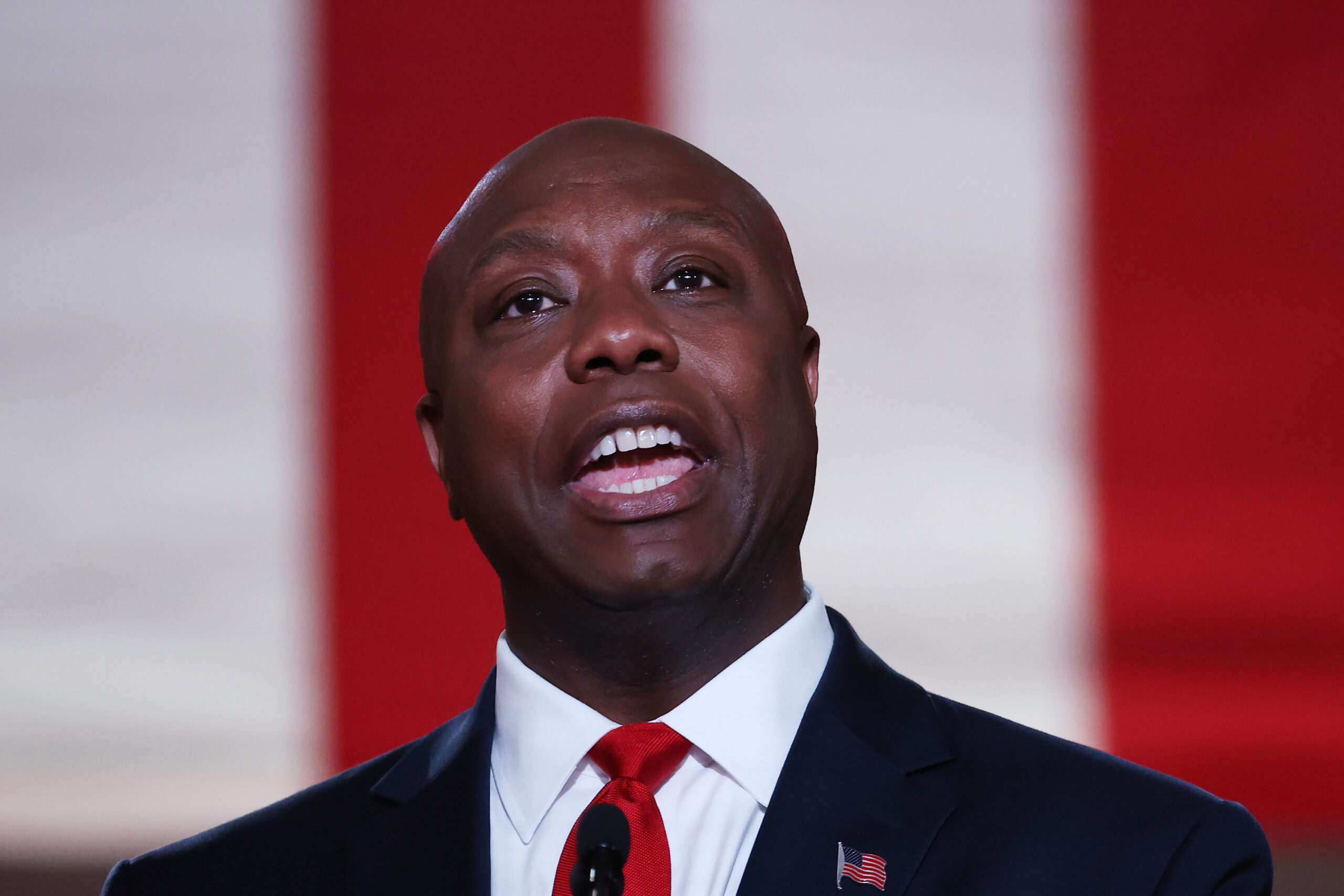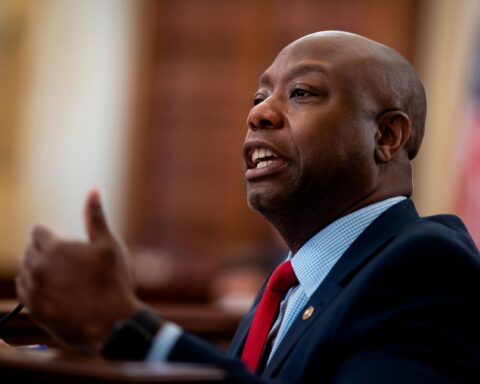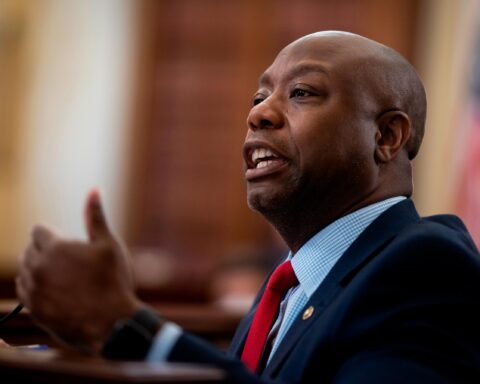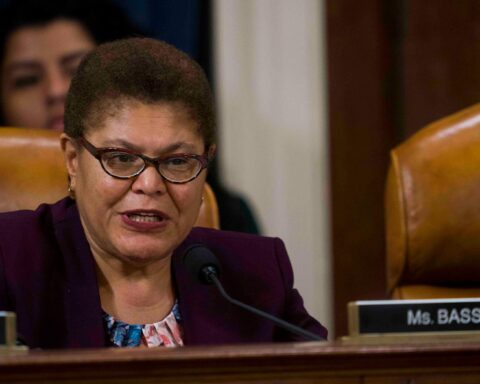Sen. Tim Scott, a key player in the bipartisan congressional effort to overhaul policing, will step into the national spotlight Wednesday, handpicked by GOP leadership to give the Republican rebuttal to President Joe Biden’s first address to a joint session of Congress.
The speech offers Scott a national platform and a chance to speak to many Americans for perhaps the first time at a moment in which he is playing a critical role in the effort to weave together a policing bill that can pass the narrowly divided US Senate.
While Scott is keeping many of the details of his speech to himself, the South Carolina Republican said he’s done “an appropriate level of practice.”
“You do your homework and you do your best to … anticipate what he’s going to say and be in a position to share with the nation a different way, at least what I think is a better way,” Scott said on Tuesday.
Scott would not elaborate on which issues he plans to address or if he would be discussing the effort to overhaul policing.
“I think it should be a surprise to everybody,” he said of his speech, but, as a well-known fan of colorful socks, he did divulge that he had bought a new pair especially for the occasion.
Scott’s appearance comes as his profile has continued to rise on Capitol Hill. He is the only Black Republican in the Senate and has spent years highlighting racial tensions with police. He proposed legislation in 2015 to create a national database of police use-of-force incidents that resulted in death after an unarmed Black man, Walter Scott, was killed by a police officer in Scott’s hometown of North Charleston, South Carolina.
In 2016, he gave an impassioned, deeply personal series of speeches on the Senate floor detailing his experience as a Black man in America. Last summer, in the wake of George Floyd’s death, he drafted legislation aimed at overhauling policing, an effort that ultimately failed on the Senate floor. Now he’s at the center of a new bipartisan effort, a delicate process encased in cautious optimism from both sides of the aisle.
Working toward a compromise bill
Scott’s speech comes as his discussions over a bipartisan Senate bill overhauling policing with Democratic Sen. Cory Booker of New Jersey and Democratic Rep. Karen Bass of California, the author of the House-passed George Floyd Justice in Policing Act, have intensified in recent weeks. Their goal remains crafting a compromise bill, according to a source familiar with the talks. During last summer’s failed effort, both sides drafted their own bills, with Scott’s receiving a 55-45 floor vote in the then-Republican-controlled Senate, falling short of the 60 votes needed to pass.
But a new political environment in a non-election year and an increasing sense of urgency spurred by a number of police shooting deaths across the country have given this effort a better chance of bipartisan success.
Bass, Booker and Scott met in person last week and on Monday night as they work to find compromises on the sticking points, according to a source familiar with the meetings. Though they have said they agree on a lot, serious issues remain. Two of them arequalified immunity, a legal defense used to protect police officers from civil litigation, and Section 242, a part of federal law that sets the bar for criminally prosecuting police officers.
On qualified immunity, Scott has suggested shifting the responsibility from individual officers to police departments, while Bass recently said the officer and department should both be held accountable. Scott previously said Section 242 was “off the table for him,” but Democrats want to change the language to make it easier to criminally prosecute officers, allowing them to be charged for “reckless” conduct as opposed to “willful” misconduct, which is the current language and a higher legal bar.
Bass recently told CNN that lowering the standard is essential to cutting a final deal.
“Because the point is that we have got to hold police officers accountable,” Bass said. “Essentially now the standard that’s used to prosecute an officer is so high. That’s why they’re never held to account. So you need to lower it just like you would for anybody.”
On Tuesday, Scott declined to say if the group had resolved those two key issues.
“I think we’re actually making progress overall,” Scott told CNN. “I hate to litigate and/or fight with through the press on these issues. They are really important issues to communities that are very vulnerable. We are trying to get to a place where we can solve those issues.”
Booker said Tuesday that the group is getting closer to its goal.
“It has to be meaningful, substantive reform. We’re not going to get everything done in one bill. There are larger, deeper problems in our country around policing that we have to try to address, but this bill must make meaningful strides to making real reforms and making people safer, making policing more accountable and more transparent and making sure that we hopefully curtail or end certain practices that we shouldn’t have in the United States,” Booker said.
But it could take some time. Bass has said she hopes to have a deal by the anniversary of Floyd’s death on May 25.
‘A very healthy relationship’
All eyes remain on Bass, Booker and Scott, who will ultimately decide if a deal can be reached. There is genuine friendship and respect among the three, who have spoken effusively of one another as this has played out.
“A very healthy relationship,” Scott said of the trio. “That does not mean we all agree, but the good news is I think we trust each other enough to actually make progress on substantive issues where there is disagreement. I think it’s really helped.”
“Tim is a friend and an honest broker,” Booker said on Tuesday. “We may disagree on a whole host of things, but we have worked together to get major bills done in the past. I have a lot of faith in him. I believe we’re in a historical moment. History has its eyes on us. And there’s an urgency in our country, and may we both rise in this Senate negotiation to get something substantive and meaningful done.”
Booker added that Scott is a “good faith actor, and he’s also a Black man in America who knows a lot of these issues personally. If anybody can get it done on his side, he’s the right person to be negotiating with.”
Bass has praised Scott as a “wonderful ally and partner.”
When Bass was seen heading to Booker’s office on Monday to meet with Scott and him, she was carrying vegan cupcakes. Booker, who is a vegan, was about to celebrate his birthday.
The three also bring with them the strong backing of their leadership and the understanding that if they agree to it, their leadership will as well.
Booker said this week that he’s confident Scott can deliver GOP votes if they are able to get a deal. Senate Minority Leader Mitch McConnell has publicly supported Scott’s current efforts on overhauling policing after asking him last summer to craft the original GOP proposal.
Senate Majority Leader Chuck Schumer said Tuesday that he had met with Booker and Sen. Dick Durbin, an Illinois Democrat who is Senate majority whip and chairs the Senate Judiciary Committee, for an hour earlier this week to discuss a potential bill. Booker has said he’s been given “wide latitude” to do everything he can to get a deal.
“They’re making good progress with Sen. Scott,” Schumer said on Tuesday. “This is a serious problem. We need strong legislation. And we’re hopeful that the Booker-Scott negotiations can produce just that.”





